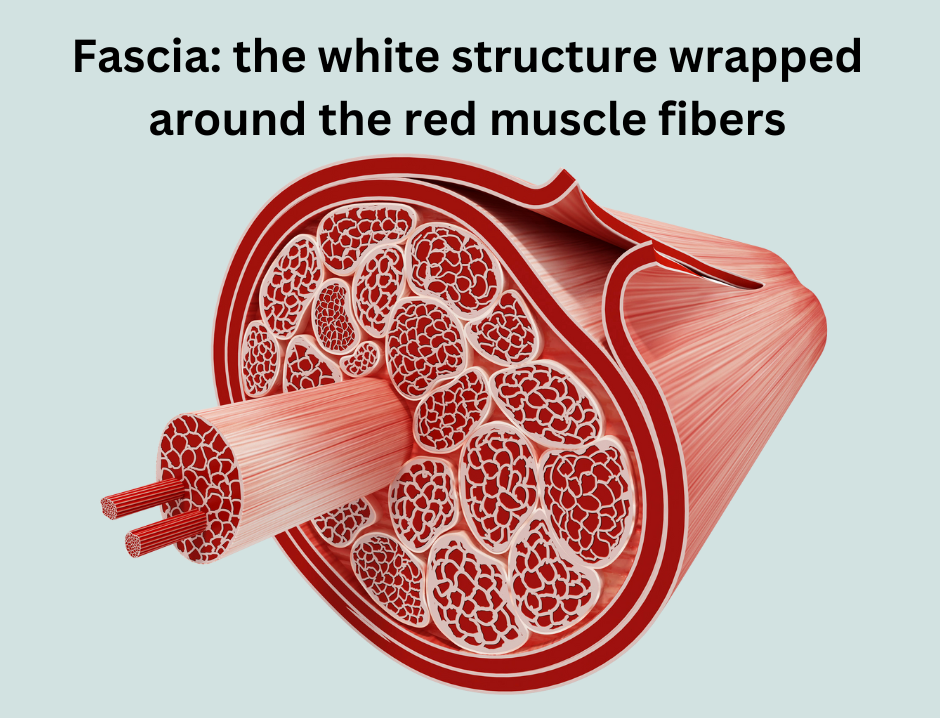Surprising Facts about Fascia
You have likely heard about fascia, but we bet these following insights are going to shock you!
Fascia is often described as a sort of plastic-wrap around the muscles. If you have ever eaten bone-in chiken, you have likely seen this structure around individual muscle bellies.

Facia has many key functions that most people are generally familiar with:
- It seperates the muscles from each other and from the skin, allowing for smooth movement.
- It provides a pathway for nerves, blood vessels and lymphatic vessels to enter and exit.
But what you may not know is that fascia also has these key functions:
- It stores most of our body’s triglycerides (fatty acids for energy)
- It serves as an insulating layer to protect from heat loss (most of our body heat is generated by muscle action).
- It protects muscles from physical trauma.
Fascia is a fibrous connective tissue made mostly from collagen. Collagen also gives it the trademark strength and flexibility it needs to do its job well.
Issues With Facia
Several common problems can involve fascia. Massage therapists and other body workers often target areas of fascia that can become bound up, feeling tight and irritated.
Perhaps the most well known issue involving fascia is Plantar Fasciitis, a condition where the fascia on the sole of the foot becomes very painful and inflamed.
When fascia becomes damaged, inflamed or degraded, it can pose a significant challenge. It creates an overall feeling of being tight and sore.
Tight and irritated fascia can also constrict the blood and lymphatic vessels, as well as the delicate nerves, contributing to many more downstream effects like muscles that are weak, easily fatigued, and issues like sarcopenia (a muscle wasting disease).
Also, without a full and active layer of fascia around the muscles, heat is lost much more quickly. There’s a reality to the stereotype of the elderly person who always needs a blanket because they are cold while everyone else complains about the heat!
The Common Thread – and a Solution
While inflamed, fascia loses much of its flexibility due to a depletion of hyaluronic acid, a component that acts as a natural lubricant which keeps the tissues plump with fluids instead of shriveled like raisins.
Collagen production also begins slowing down in our 20’s, falling by around 1% per year. This creates a huge issue since 30% of all of our body’s proteins, and nearly every tissue in our body, is dependent upon healthy collagen.
While collagen begins to slowly degrade, hyaluronic acid gets depleted, and micro-traumas accumulate over time, it’s no wonder why most of the symptoms are written off as the “normal aging process.”
It’s not normal to fall apart as you age!
The solution is to make sure you are eating and absorbing better nutrition. Our favorite liquid collagen is a matrix that includes hyaluronic acid and chondroitin for optimal collagen synthesis and repair.
The Missing Piece of the Puzzle
You might be thinking, “But I eat well! How could I still have this issue with my fascia?”
Eating well is only part of the battle. You also have to digest and absorb that food!
The main digestive enzyme that breaks down collagen is pepsin, but it only accounts for 10-20% of your entire digestive ability. It is also an enzyme that people have tried to support for generations, and led to products like a certain namesake cola that I can’t mention which was orginally marketed as a digestive aid (take off the “N”).
Collagen by itself is a very large molecule. It is too large to be absorbed without first being broken down by pepsin. Next, there’s an interesting connection that can help you understand if your pepsin production is lacking!
No Pepsin -> Smelly Gas!
If you have foul smelling gas, this is a clear sign you are not digesting proteins correctly. This matter is making its way into your digestive tract without being fully broken down, it can’t be absorbed properly, and it becomes putrid. It is essentially rotting inside of you, hence the room-clearing smell of death!
To support your protein digestion, our go-to recommendation is to take Zypan before every meal. This supports natural stomach functions and acid production so that you can more completely digest your food. At home or on the go, we ALWAYS have this available.
And, as an added bonus for why our favoite liquid collagen is so powerful, it has already been broken down into individual peptides through a patented process, just as if it were a full collagen molecule broken down by pepsin. It has the full ratio of everything you need to build and maintain vibrant collagen so you can work hard and age gracefully.

